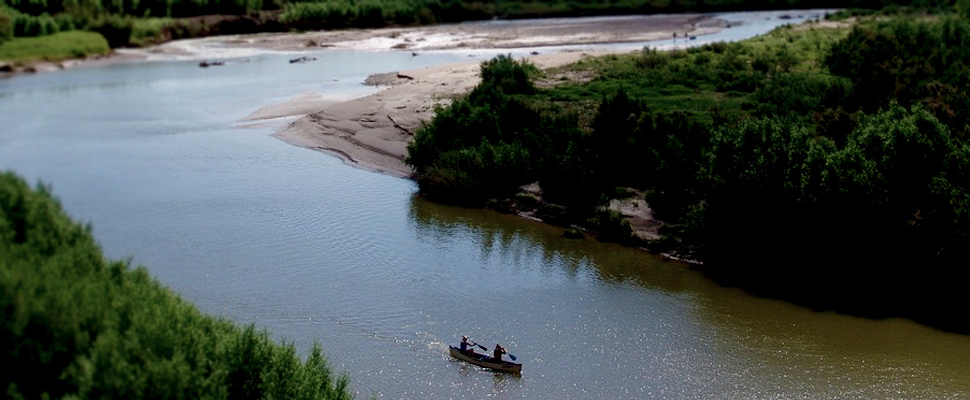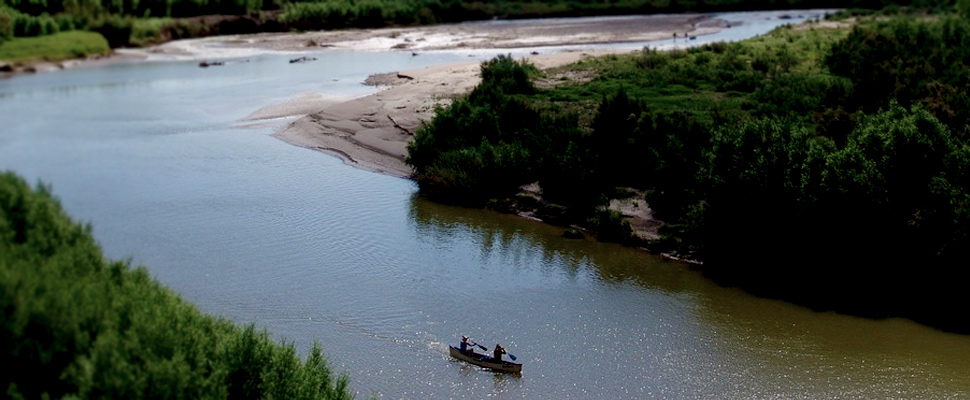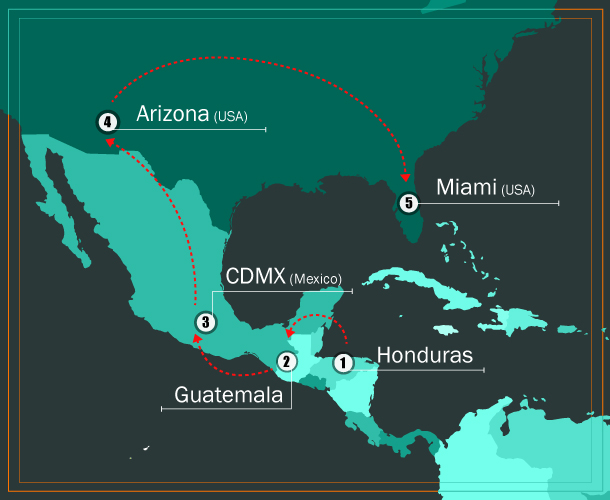Crossing the border between hunger, the river and the desert
Around 110,000 people are arrested each year trying to enter the United States illegally, but hundreds of thousands more can reach their destinations

Escucha este artículo
Leer en español: Cruzar la frontera entre el hambre, el río y el desierto

Canoe with two people sailing on the Rio Bravo on the border of northern Mexico with the southern United States / Pixabay
LatinAmerican Post | Juliana Suárez
Listen to this article
"I crossed three times until I succeeded, and, at times, the American dream turned into a nightmare," Ofelia* begins to tell.
Around 110,000 people are arrested every year trying to illegally enter the United States at different points on the border, but hundreds of thousands more are not caught and manage to reach their destinations in what becomes the beginning of the American dream. By the river, the dangerous river in which hundreds of people are drowned; through the desert, where they can also die of dehydration and heat; or jumping the walls, a form that only a few who have agility venture.
Leer en español: Cruzar la frontera entre el hambre, el río y el desierto
Fifteen years ago, Ofelia Interino decided that she did not want to live in Honduras anymore. As if poverty was not enough, the gangs, known in Central America as Maras, harassed the cities charging business owners, like her, as a way to ensure her well-being and her family's. Living around this violence became a risk to raise four children. Drug trafficking began to expand and gang members attracted young people like her children inviting them to a world where drugs were common.
That being the case, Ofelia could not wait for the moment to leave to where her husband was; months ago he had managed to obtain a visa and had gone legally to the United States, although at the end of his visa, he would remain illegally in Florida. She made three attempts before arriving at the place where her husband was.
With tears in her eyes and a trembling voice, she remembers that she decided to leave definitively when her mother's cancer was getting worse: "I needed medicine and in Honduras, there was no way to get it, nor did I have the money to look for it. It was the last time I saw her and shortly after she died," she said.
After two attempts in which she was deported, 13 years ago she hired a guide – as she calls it, although it is better known as a coyote – from Honduras and he took her with other people from her neighborhood along the route: Honduras-Guatemala-Mexico -U.S.

"From Honduras to Guatemala the journey went well, we went by bus and at night the bus stopped at some hidden mountain on the road so that we could sleep," she said. Crossing from Honduras to Guatemala is easy, there is not even a toll so it doesn't matter, but to get to Mexico I do not know how they did it, they had to have contacts.
The buses they went on during this trip were first class, the guides bought food and constantly gave them water.
Maybe you'll read: Mexico's new National Guard was created to fight crime, but now it's in a face-off with migrants
The dream becomes a nightmare
Once in Mexico City, the real journey began and it ended up becoming Ofelia's torment, one that hundreds of thousands of people live. The first-class buses were replaced by trucks where fifty people were sitting on mats. Meals and water were becoming scarce. The toilets became a barrel in the middle of the crowd of people, the smell of the truck affected everybody and many people began to get sick. The nights turned into an uncomfortable silence that seemed like it would never end.
Stripped of their goods, their hygiene and their family, those in this situation begin to doubt whether reaching the American dream was worth it, or if perhaps they were becoming a hostage of the same violence from which they escaped.
Ofelia remembers that on the way, while everyone was in the truck, three young women who crossed the border alone were lucky – she thought at first – that the coyotes took them to the front seats. "They were more comfortable, but later we realized that there was a price," said Ofelia.
In the day, the silence made the uncomfortable passengers ask what would happen to those girls who were ahead. At nightfall, they began to hear music and noise, until they heard the girls talking, shouting and, late at night, "you could hear how men abused them," says Ofelia, "when we got off the border I did not see them continuing the route, surely those men keep them and who knows what happened to the girls".
When everything starts looking dark
Despite the turmoil that Ofelia was living, the difficult thing was crossing the border. The truck left them on one side of the border and later another transport would wait for them. Then they had to run for their lives, fleeing not only from migration, but also from 'Los Zetas', a Mexican criminal group that existed at that time and, in addition to drug trafficking, they also participated in human trafficking and wandered on the border to recruit young people or to intimidate civilians.
At that point, the fifty people who had not been able to move for days and had stayed in one place, like animals, among their feces, could finally get off: all vomited and many, including Ofelia, had some infection. To the diseases, the weakness was added, for 3 days they had not received more than a pair of sandwiches and a little amount of water.
Before starting to run for their lives in the Arizona desert, the coyotes offered a drink to each person accompanied with a cocaine pass: anyone who didn't do it, could not continue. "They said that it was to make the road easier because we had to run very fast and that gave you agility, because at 5 a.m. the police arrived and those who stayed behind were left alone, nobody was going to wait", she says.
Ofelia Interino has never consumed alcohol, much less cocaine, so she refused to do so. Like her, her traveling companion and another friend from the neighborhood, who was evangelical, didn't want to do it. Refusing to do it cost them dearly. The coyotes, upon receiving the rejection, not only chose to leave without them, but before they finished removing their belongings; a little water, food, and medicine; They knocked them to the ground and kicked them until they were almost unconscious.
Between the darkness of the night and the dust of the desert that impregnated the air thanks to the strong wind, Ofelia and other people who decided not to consume what the coyotes sent, had been abandoned, beaten, and without knowing where to go. The only thing they could do was run to avoid Los Zetas. While they ran, without energy but without stopping, they saw on the way bodies of people, like them, who had not been able to continue.
Sunrise
When they thought it was the end, angels appeared. The Frontier Angels. Some men approached them, dressed as an officer, but instead of deporting them, they gave them water and helped them to heal their wounds.
Frontier Angeles is a nonprofit organization that has spent more than thirty years addressing the most traveled border crossings to provide help like the one Ofelia's group received. Sometimes they only leave bottles of water on the road for some migrants to find in a thirsty moment.
For La Información, the founder of the organization, Enrique Morones, said that every time, with Trump, the border situation is more complicated and that has not prevented the passage, but it has worsened the conditions in which they pass. People choose for more dangerous routes, deal with more aggressive coyotes, and receive worse deals for higher prices. "Now the situation is very sad, Trump has given some very ugly, very racist messages, especially against Mexicans, but love will win at the border"
These angels tried to convince the group to go to immigration, where they could ask for political asylum and enter the United States legally, and continue their American dream. Ofelia, as she had already been deported, could not go through there and the group decided to continue on their way through the desert.
Having more energy and being less thirst, they managed to find another group that was running under the direction of two guides. They helped them and they were part of the group. Everything seemed easier now, they went in a truck to a house. There, they could communicate with their family so that they could send the remaining money to pay these coyotes and to buy a ticket to their final destination: Miami.
When arriving at that house, four rooms for forty people seemed a luxury compared to what they had lived before. Finally, after more than ten days, they could eat chicken, rice, and something more than a sandwich. While waiting to contact their family, they spent their time watching television in a room in the house.
Three days passed in that house, a wait that seemed like an eternity because the end of the nightmare, and the true beginning of her American dream, finally was coming true. They took a bus in which they lasted nine days. They only went down to the bathroom and got food at the gas stations. That path, for Ofelia, was no longer stormy. The guides behaved like kind people, after the hell they had lived in the desert, a bus as a home was a privilege.
"Everything was better than living in Honduras," Ofelia ends.
The braveness of the Rio Bravo
Unlike Ofelia and her tortuous trip, Carmen* arrived three months ago to Miami. Like the whole family of her husband, they have gone through the border to settle in Florida in search of a better future.
"I was scared because you hear terrifying stories, but we did it very well," says Carmen, who crossed the border with her husband and their three-year-old daughter. "From Honduras to Mexico I traveled by bus or car in the daytime, and at night the guides took us to sleep in hotels and eat in restaurants." They never went hungry, thirsty, or uncomfortable.
Unlike Ofelia, Carmen's family arrived at the border with Texas, on the banks of the Rio Grande. There, they were offered three ways to go: by the river, the desert, or by jumping over the wall. As they were a complete family, the coyotes suggested the river. At this point, the guide who had accompanied them all the way from Honduras, a friendly young Mexican man of about 35 years old, said goodbye to them while he sent them with other men.
Read also: The essence of the Salvadorean gangs that no government can break
-I was on the riverbank and for the first time on the road I was scared. We were received by some people that I am sure were from one of those gangs, I thought: 'everything was a lie' – continued Carmen – luckily I was wrong.
They took away their belongings, cell phones, watches, and money, but at least they were safe and sound, she thought.
Once they crossed, in a raft, the river, they had to make their way in the middle of the jungle, since there was no open road. Her husband was the leader of the group, that was made up of Carmen with his daughter and two other women with their children. He managed to direct everyone to the road. A few meters later, they could see the migration offices.
They did request political asylum, fleeing violence and persecution for insecurity in Honduras. During the cold night, hugging her baby, while her husband was in the men's hall, Carmen did not know whether to feel joy or sadness.
The melancholy of having to take her daughter to sleep on the floor consumed her, but she knew that in Honduras there was no way to live. The business that her husband had in his native country had broken because of the criminal groups, which were responsible for scaring away the clientele when a landlord did not have money to pay the fees that were invented to collect.
A day later, they processed the permit to be in the United States without being deported. Today, three months later, Carmen works for a family in Miami, like Ofelia, and with the help of a lawyer he hired, is waiting for Political Asylum.
While she cries, she ends up saying: "It feels good to be able to talk about it. In three months I had not talked to anyone, a weight seemed to have been lifted from my shoulders."
* The names were changed





